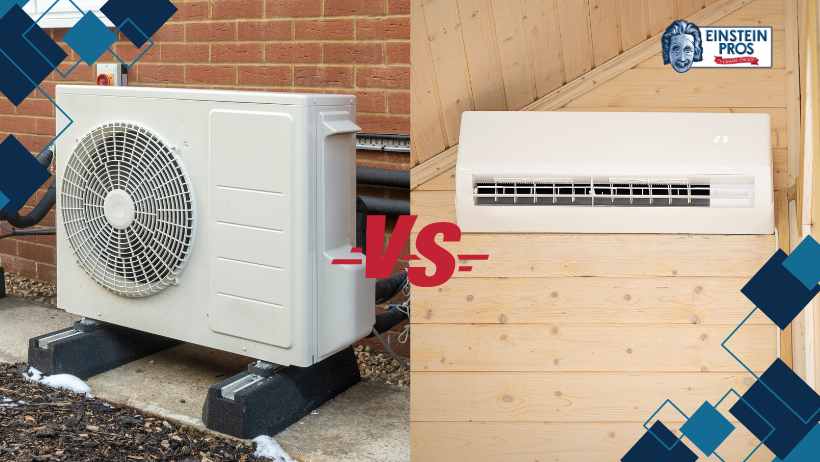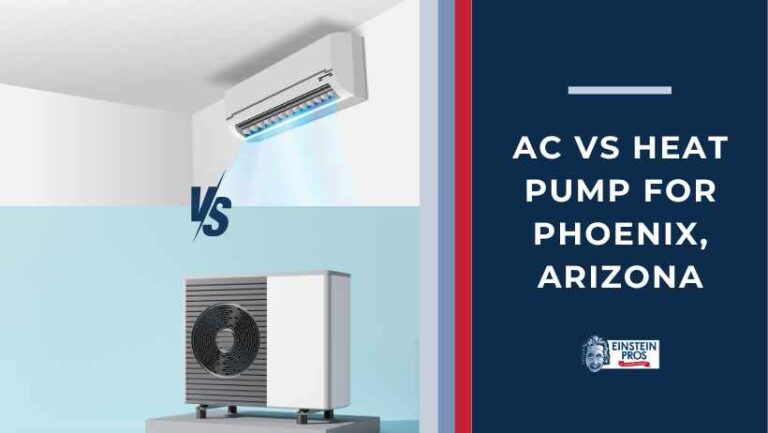As temperatures fluctuate from high to low, the decision between a heat pump and a traditional air conditioning (AC) system becomes a pivotal choice for homeowners seeking effective solutions to have a comfortable home. Each option comes with its own set of advantages and considerations. In this exploration, we’ll delve into the distinctions between heat pumps and AC systems, make the best decision on ac vs heat pump in Phoenix, and know proper maintenance tips for both HVAC units.
AC vs Heat Pump Comparison
1. Operating Principles
Air Conditioning (AC) Systems
- AC systems are designed solely for cooling purposes. They operate by extracting heat from indoor air and expelling it outside, leaving a cooler and more comfortable indoor environment. Traditional AC systems use a refrigerant to facilitate the heat exchange process.
Heat Pumps
- On the other hand, heat pumps are versatile systems capable of both cooling and heating. During warm weather, they function similarly to AC systems by removing heat from indoor air. In colder months, however, they reverse the process, extracting heat from outdoor air (or from the ground in geothermal systems) to warm the indoors.
2. Heating Capability
Air Conditioning (AC) Systems
- AC systems cannot provide warmth. They are specifically engineered for cooling purposes and cannot be used as a primary heating source during colder seasons.
Heat Pumps
- Heat pumps excel in versatility. They can seamlessly transition between cooling and heating modes, making them a cost-effective solution for year-round climate control. This dual functionality can be particularly advantageous in regions with milder winters like in Phoenix.
3. Energy Efficiency
Air Conditioning (AC) Systems
- AC systems are generally more energy-efficient when solely focused on cooling. They are optimized for this specific function and can be highly effective in maintaining a comfortable indoor temperature during hot weather.
Heat Pumps
- Heat pumps are recognized for their energy efficiency, especially in moderate climates such as in Phoenix. By leveraging the ambient heat in the air or ground, they provide both heating and cooling with lower energy consumption compared to traditional heating systems.
4. Initial Costs and Installation
Air Conditioning (AC) Systems
- AC systems are typically more straightforward in design and installation, leading to lower initial costs. “HVAC Installation near me” complexity may vary based on the specific requirements of your home, but in general, AC units are known for their simplicity.
Heat Pumps
- Heat pumps, with their dual functionality, may involve slightly higher upfront costs. The heat pump installation process can also be more complex, especially for ground-source (geothermal) systems. However, the long-term benefits of heating and cooling within one system may offset the initial investment.
5. Climate Suitability
Air Conditioning (AC) Systems
- When comparing heat pump vs AC, AC systems are well-suited for regions with predominantly hot climates where cooling is the primary concern. They excel in efficiently maintaining lower indoor temperatures during the summer months.
Heat Pumps
- Heat pumps are ideal for areas with mild to moderate climates. While they can handle both heating and cooling, they may not be as effective in extremely cold conditions, as extracting heat from frigid air requires more energy.
6. Environmental Impact
Air Conditioning (AC) Systems
- AC systems, while effective in cooling, may contribute to higher energy consumption and associated environmental impacts, especially if the electricity used comes from non-renewable sources.
Heat Pumps
- Heat pumps, particularly those using environmentally friendly refrigerants, can be a more sustainable choice. Their ability to extract and transfer heat makes them inherently more energy-efficient, reducing their overall environmental footprint.
7. Maintenance Requirements
Air Conditioning (AC) Systems
- AC systems generally have straightforward maintenance needs, primarily focusing on filters, coils, and refrigerant levels. Regular check-ups from an HVAC technician can ensure efficient operation during peak cooling seasons.
Heat Pumps
- Heat pumps, with their dual functionality, may have additional components involved in the heating process. Regular maintenance is crucial to ensure both the heating and cooling aspects operate optimally.
8. Durability and Longevity
Air Conditioning (AC) Systems
- AC systems are known for their durability and can have a longer lifespan when well-maintained. With a straightforward design focused solely on cooling, they tend to withstand wear and tear effectively.
Heat Pumps
- Heat pumps, being dual-purpose systems, may experience slightly more wear due to the additional components involved in the heating process. However, with regular maintenance, they can still provide a durable and reliable solution for both heating and cooling needs.
9. Noise Levels
Air Conditioning (AC) Systems
- AC systems, especially modern ones, have been designed to operate quietly. The noise levels are generally low, contributing to a peaceful indoor environment.
Heat Pumps
- When comparing heat pump vs AC, heat pumps can operate at similar noise levels to AC systems, making them suitable for residential settings. Regular maintenance from an HVAC professional Phoenix and choosing a reputable brand can further minimize operational noise.
10. Technological Advancements
Air Conditioning (AC) Systems
- AC technology has seen advancements primarily in terms of energy efficiency and smart technology integration. Modern AC units often come with programmable thermostats and energy-saving features.
Heat Pumps
- Heat pumps have also benefited from technological advancements, with improvements in efficiency and smart features. Smart thermostats can enhance the control and scheduling of both heating and cooling functions, contributing to overall energy savings.
11. Government Incentives and Rebates
Air Conditioning (AC) Systems
- While government incentives and rebates are often available for energy-efficient HVAC systems, the focus has traditionally been on heating and cooling separately. AC systems may qualify for certain incentives, but they may not be as comprehensive as those for heat pumps.
Heat Pumps
- Heat pumps, being dual-purpose and energy-efficient, often qualify for a broader range of incentives and rebates. Government programs recognizing the energy-saving potential of heat pumps may provide more substantial financial benefits.
12. Adaptability to Home Designs
Air Conditioning (AC) Systems
- AC systems are adaptable to various home designs and sizes. The flexibility in installation makes them suitable for both single-family homes and apartments.
Heat Pumps
- Heat pumps, with their dual functionality, are also adaptable to various home designs. However, their installation may require careful consideration of the specific heating needs of the home, especially in regions with colder winters.
13. Resale Value Impact
Air Conditioning (AC) Systems
- The impact of an AC system on home resale value is generally positive, given its standard presence in most homes. However, modern, energy-efficient systems may contribute more to the overall value.
Heat Pumps
- Homes equipped with heat pumps may have an added resale advantage, especially in regions with fluctuating temperatures. The potential for year-round comfort and energy efficiency can be an appealing feature for potential buyers.
After learning about the differences between AC vs heat pumps, let’s discuss maintenance tips for these two HVAC systems.

Heat Pump Maintenance Tips
1. Regular Filter Checks and Replacement
- Inspect Filters Monthly: The heat pump traps dust, dirt, and other particles affecting system efficiency. Check them monthly and replace filters if dirty.
- Use High-Efficiency Filters: Opt for high-efficiency AC filters to improve indoor air quality and reduce strain on the heat pump.
2. Clean the Coils
- Evaporator Coils: Clean evaporator coils annually to prevent dirt buildup, ensuring efficient heat exchange.
- Condenser Coils: Regularly clean condenser coils to maintain proper heat release and optimize overall performance.
3. Clear Debris Around the Unit
- Outdoor Unit: Keep the area around the outdoor unit clear of debris, leaves, and other obstructions to maintain proper airflow.
- Indoor Unit: Ensure the indoor unit has ample space for proper air circulation, preventing any blockages.
4. Check Refrigerant Levels
- Professional Inspection: Schedule professional maintenance to check refrigerant levels and address any leaks or issues promptly. Also, it’s important you know the signs you need heat pump repair to avoid further damage to your heating and cooling system.
- Ensure Proper Refrigerant Charge: Maintaining the right refrigerant charge is crucial for efficient heat pump operation.
5. Inspect Thermostat Settings
- Calibration Check: Regularly calibrate the thermostat to ensure accurate temperature readings and efficient operation.
- Programmable Thermostats: Consider upgrading to a programmable thermostat for better control and energy savings.
AC Maintenance Tips
1. Replace or Clean Air Filters Regularly
- Check Monthly: Similar to heat pumps, inspect and clean AC filters monthly. Replace them when necessary.
- Consider Filter Upgrades: Explore advanced filter options to enhance indoor air quality and reduce strain on the AC system.
2. Keep Evaporator and Condenser Coils Clean
- Annual Cleaning: Clean evaporator coils annually to maintain efficiency and prevent mold growth.
- Condenser Coil Maintenance: Regularly clean condenser coils to optimize heat dissipation and overall AC performance.
3. Ensure Proper Clearance Around the Outdoor Unit
- Remove Debris: Periodically clear away leaves, grass, and other debris from around the outdoor unit for efficient airflow.
- Trim Overhanging Branches: Trim branches and foliage to prevent interference with the outdoor unit.
4. Check for Refrigerant Leaks
- Professional Inspection: Schedule professional maintenance to check for refrigerant leaks and address any issues promptly.
- Optimal Refrigerant Levels: Ensure the AC system has the right refrigerant levels for efficient cooling.
5. Inspect Ductwork for Leaks
- Regular Inspection: Check ductwork for leaks, as they can significantly impact the AC system’s efficiency.
- Seal Leaks Promptly: Address any ductwork leaks promptly to prevent energy waste and maintain optimal performance.
Heat Pump vs. AC: Key Differences in Maintenance
While heat pumps and AC units share some maintenance requirements, there are notable differences to consider.
1. Defrosting for Heat Pumps
- Winter Operation: In colder climates, heat pumps may accumulate frost during winter. Regularly defrost the heat pump to maintain efficiency.
- Defrost Settings: Familiarize yourself with the defrost settings on your heat pump and use them as needed.
2. Seasonal Switching for AC Units
- Off-Season Preparation: During the off-season, cover the outdoor unit to protect it from debris and harsh weather conditions.
- Seasonal Maintenance: Conduct thorough maintenance before the cooling season begins to ensure optimal performance.
3. Professional Inspections
- Annual Checkups: Schedule annual professional inspections for both heat pumps and AC units to identify and address potential issues. Make sure to get prompt heat pump repair or AC repair in Phoenix to immediately fix the problems.
- Qualified Technicians: Ensure that the technicians performing maintenance are qualified and experienced in handling both heat pumps and AC systems.
Conclusion
In conclusion, proper maintenance is the key to ensuring the longevity and efficiency of your heat pump and AC unit. By following these tips and scheduling professional maintenance from Einstein Pros, you can create a comfortable living environment, reduce energy costs, and extend the lifespan of your HVAC systems. Regular attention to both heat pump and AC maintenance will keep your home cool in the summer and warm in the winter, providing year-round comfort and peace of mind.
